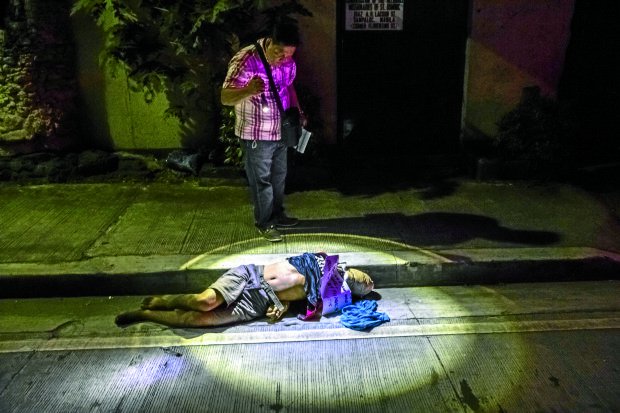NEW YORK—Recently I was one of several interviewed by a not-for-profit media organization, America Abroad. The focus of the hour-long program was the complicated and often tricky relationship between the Philippines and that country’s ally and former colonizer, the United States.
Among the subjects discussed were President Duterte’s unrelenting war against drugs, human rights violations, the state of justice, Duterte’s record as mayor of Davao City, his approval ratings, and the cultural complexities of being Filipino.
On the whole, I thought it was a fairly sober and balanced report, and it can be listened to here:
Among those interviewed by the program’s correspondent in Manila, Michael Sullivan, was a 31-year-old Ph.D. student at De La Salle University, by the name of Daniel Bernardo. This segment comes right after one that looks at the killing by the police of a suspected drug user or pusher in a nearby poor neighborhood, six bullets lodged in his chest. As in so many of these killings, the cops say the dead man shot first, but his sister and mother claim otherwise, describing the killing bluntly as an execution. Interviewed at a bar, Ph.D. candidate Bernardo had this to say on EJKs:
“I don’t even consider it a killing. Maybe it’s a moral killing in a way. But no EJK. It’s like a pest in your house, if you see a cockroach or a mosquito, what would you do? You’d kill it. For me, drug user, drug seller, sickness in society, you need to disappear.”
Bernardo gives Digong a grade of A- for his first year in office. He goes on: “I think he’s doing very good. He’s like a father for every Filipino. He’s a game-changer, not traditional politician. Duterte is someone so different.”
Clearly, this upper middle-class man feels no common bond of humanity with those EJKs, the great majority of whom are desperately impoverished. It doesn’t seem to bother him that the victims are automatically what the police say they are: addicts and/or pushers.
In the moral universe that the president has created, things are inverted: the poor are guilty until proven innocent, and cops are innocent even when clearly guilty. Duterte has said that were policemen to be convicted in any of these murders, he would pardon them. The implications for the justice system are disturbing.
Perhaps the Ph.D. student was encouraged by Duterte’s comment that, as Hitler did in the genocide of the Jews, he would gladly slaughter 3 million addicts, underestimating by half the casualties of the Holocaust. In Bernardo’s equating of the EJKs with cockroaches and mosquitoes, we can hear echoes of similarly horrifying comparisons made by the Nazis, in order to render it easier, and morally acceptable, to exterminate the tribes of Israel. The Nazi propaganda machine, for instance, claimed that Jews kidnapped Christian children just before Passover, as they needed the blood of a Christian child, to mix in with their bread.
This strategy of divesting the oppositional Other of humanity has a long history of manunkind, as e.e. cummings once put it. Thus, in their wars against Native Americans, the U.S. Army and those who settled in Native American territories, the perception of the former was summarized by the slogan, “The only good Injun is a dead Injun.”
During the 1899 Philippine American War, Filipinos were described variously as savages, and as monkeys without tails by U.S. soldiers, many of whose officers were veterans of the wars against Native Americans. Similar sentiments were expressed towards the Vietnamese who resisted the U.S. forces in this ill-conceived war, as morally wrong as the U.S. war on the Philippines was. The Vietnamese were seen as having less regard for human life than Westerners. Therefore killing them would be justified and much easier to carry out.
This dehumanization of Digong’s anti-drug war victims underlies what seems to be indifference on the part of the larger population with regards to these EJKs. Do they not view those murdered as fellow Filipinos? How can they cry for justice when the judicial process is undercut in each and every instance where a suspected addict or pusher is routinely bumped off on the streets?
Why should this administration put the rights of policemen above the rights of other Filipinos? No one is above the law, including the president. These executions are not lawful; they simply are awful. Human Rights Watch, according to its latest report, “has debunked government claims of the lawful nature of the deaths of more than 7,000 suspected drug users and dealers killed since Duterte took office on June 30, 2016.”
Only by believing that the dead are cockroaches and mosquitoes, can the conscience be lulled into accepting the killings as justified.
What has happened to the nation’s moral compass? For how long will we abdicate our responsibility as our brothers’ and sisters’ keepers?
Copyright L.H. Francia 2017


